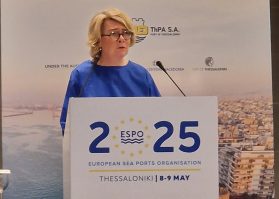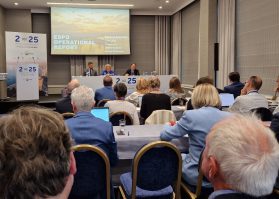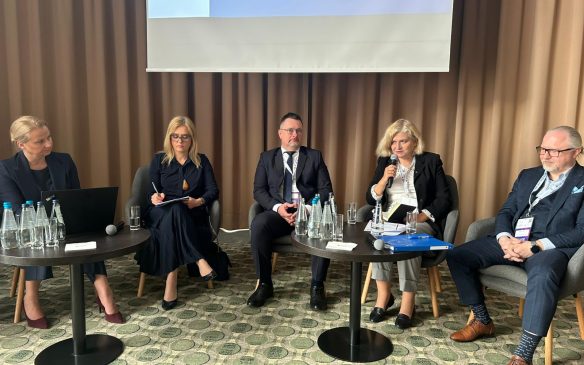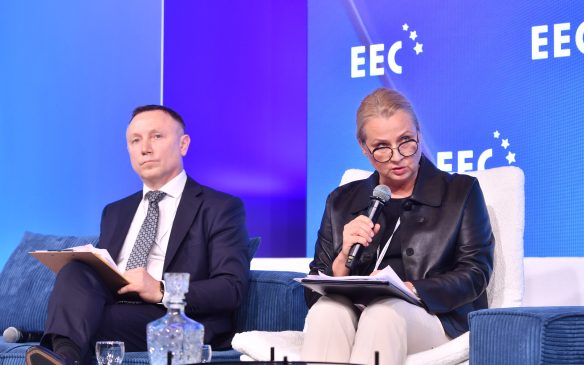European ports in the face of global challenges
The 21st edition of the prestigious European Sea Ports Organisation (ESPO) conference was held in ancient Thessaloniki, located in the picturesque Thermaic Gulf. This is one of the most important events in the European port industry calendar, as it brings together decision-makers, experts and representatives of key ports, including the Port of Gdańsk.
The theme of the meeting this year was the port sector’s response to dynamically changing geo-economic and geopolitical conditions. The elections in Europe and the United States in 2024 did not bring the expected stabilisation – on the contrary, the beginning of 2025 saw an escalation of global tensions. The future of European ports – their role, tasks and challenges – was discussed in this context.
Seaports, as key links in the logistics and energy chains, as well as gateways to international trade and industrial clusters, are becoming even more important today. They are becoming not only places where goods flow, but also strategic partners engage in building Europe’s economic and military resilience.
At the same time, their exposure to threats continues to grow. In the current situation, they may become the target of attempts to destabilise the region. This makes the discussion about their security, modernisation and future all the more important.
A voice from Gdańsk: investments in security and development
Alan Aleksandrowicz, Vice-President for Finance and Security at the Port of Gdańsk, participated in the panel discussion that concluded the conference. He emphasised the need for a comprehensive approach to the development of ports, which today are expected to perform many functions at once, ranging from economic to defence functions.
‘Strengthening ports and adapting them to perform all their assigned roles requires a comprehensive approach. Key areas of action include upgrading infrastructure, expanding quays and terminals, increasing the cargo handling capacity, deepening fairways and adapting them to accommodate larger vessels. Due to the uncertain geopolitical situation, investments in dual-use infrastructure (handling of military equipment) are crucial. We strive to ensure that handling systems are modern, and therefore automation and digitisation are necessary. We must focus on multimodality – the combination of sea, rail and road transport’, argued Alan Aleksandrowicz.
The Port of Gdańsk plays a strategic role in ensuring Europe’s military, food, economic and energy security, and thus meets the European Union’s goals in terms of security, resilience and sustainable development. Ports such as Gdańsk are not only a transit point for cargo, but also a key element in the European Union’s frontline infrastructure that directly support its resilience and competitiveness.
In terms of economic and energy security, the Port of Gdańsk allows the diversification of raw material imports, including LNG and alternative fuels. It is also preparing to implement an onshore power supply system (OPS) and low-emission bunkering infrastructure, which are essential elements of the energy transition. In order to fully utilise the potential of the Port of Gdańsk in achieving the EU’s strategic objectives, creating the required financial and legislative support is essential. Simplifying and speeding up the administrative and regulatory procedures at the EU level is of paramount importance.
Port of Gdańsk to host the next edition
At the end of the conference, it was announced that the next, the 22nd, edition of ESPO will be held in Gdańsk in 2026. This is a great honour and an opportunity to present Poland’s experience and potential on an international stage.
The Port of Gdańsk invites all industry representatives to participate in next year’s event, which – as this year’s one shows – is not only a place for the exchange of knowledge, but also an important platform for shaping the future of European ports.
***
The European Sea Ports Organisation (ESPO), with its registered office in Brussels, represents the common interests and promotes the shared views and values of its members before European institutions and policy makers. It was established in 1993, with the mission of influencing European Union policy in order to create a secure, efficient and environmentally sustainable European port sector, operating as a key element of the transport industry.




